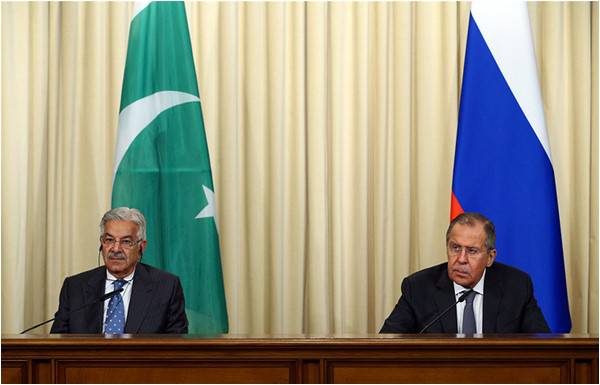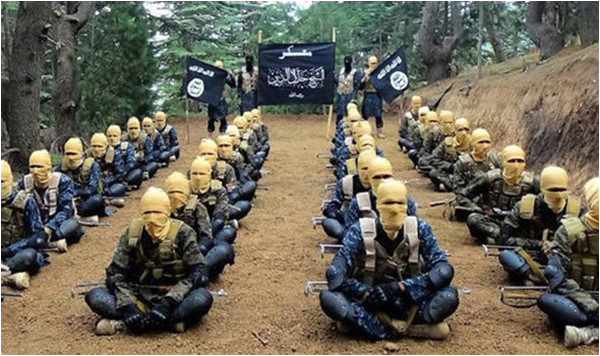
In April, when Defence Minister Khurram Dastagir Khan told a meeting of Defence Ministers of Shanghai Cooperation Council (SCO) in Beijing that Islamic State of Iraq and the Levant’s (ISIS) growing presence in Afghanistan is a source of concern for all countries neighbouring Afghanistan, he was not making a routine statement. His statement reflected the growing perception among decision-makers in Islamabad that Americans are bringing and introducing ISIS fighters into Afghanistan.
Two months ago when former foreign minister Khawaja Asif visited Moscow, Russian foreign ministry officials told him in unequivocal terms that the introduction of ISIS fighters into northern Afghanistan was a sinister development and that they were extremely concerned. The Russian foreign ministry official told Asif that intelligence had shown unmarked helicopters delivering ISIS fighters into northern Afghanistan along with weapons and equipment. It is reported that Russian officials even urged the Pakistani minister to question Americans about the role their military had been playing in bringing ISIS fighters in the region.
Since then, the Pakistani military and political leadership has been in direct talks with at least two countries over the rise of ISIS as a military force in northern and eastern Afghanistan, a senior government official says. These countries are Russia and Iran. Pakistani officials while visiting the capitals of these two countries were confronted with questions related to the rise of ISIS in Afghanistan. Russia and Iran have expressed concerns about ISIS in the northern Afghanistan and in the western parts of the country, respectively.
Russia is concerned about ISIS areas which border Tajikistan, Uzbekistan and Turkmenistan since the Russian security establishment considers Central Asia to be within its sphere of influence. Iran is concerned for the same reasons, though Pakistani officials say that these are concerns about the overall rise of ISIS in Afghanistan.
Pakistan is also concerned about the rise of ISIS in the eastern Afghan province of Nuristan which borders Pakistani territory. Military officials have publicly expressed concerns over the rise of ISIS in this province, which, they say, is a source of sectarian violence on their territory.
Pakistani security experts say that some Salafi groups in Nuristan, which were formerly allied with the Taliban, have joined hands with ISIS. Pakistan denies the organised presence of ISIS on its soil but in a recent meeting between the civilian and military leadership, the security situation created by ISIS-led violence in Afghanistan and in Quetta was discussed.
Kurram Iqbal, an associate professor at National Defence University and a counter-terrorism expert, told this scribe that in eastern Afghanistan, ISIS fighters may have found a willing host. “There is a Salafi group based in Nuristan which was formally allied with the Taliban and it has now joined hands with ISIS,” Iqbal said.
Pakistani has, so far, not entered any formal arrangement with Russia and Iran but there are reports indicating that Russia, Iran and Turkey have formally agreed to form a mechanism for periodically reviewing the security implications of ISIS in Afghanistan
Despite the persistent flow of information from various regional capitals that Americans are bringing ISIS fighters to Afghanistan, Pakistan has also not directly spoken of American involvement in this development. However, some so-called defence analysts on Pakistani television with obvious links with the military establishment have not hesitated from accusing America of bringing ISIS to Afghanistan.

As regional diplomacy over the fate of Afghanistan intensifies, Pakistan officials might find it convenient to come out formally with the allegations against America in this regard. In March, neighbours of Afghanistan gathered in Tashkent and proposed ideas for a peaceful resolution of the Afghan conflict and at the same time expressed concerns about ISIS in the country. The idea was to bring the Taliban to the negotiating table with the Afghan government so that together they could confront the new threat on the horizon.
ISIS in Afghanistan may turn the Pakistani military’s age-old dream of bringing the Taliban into the diplomatic mainstream of regional diplomacy into a reality. Now every regional player is in talks with the Afghan Taliban. Russian officials serving in the region have even acknowledged recently that there has been contact between their government and the Afghan Taliban.
“Russians have been saying this publicly that the Americans are in contact with the Taliban and that they want to prevent other countries from doing the same,” says Brigadier (r) Mehmood Shah, a senior intelligence official.
Contact between the Iranian government and the Afghan government came to surface when former Taliban supreme commander Mullah Akhtar Mansoor was killed in a US drone strike on the Pakistan-Iran border while he was entering Pakistani territory via Iran. Wall Street Journal had reported that the strike took place as Mansour was being driven by taxi from the Iranian border to Quetta after a long stay in Iran.
Rahimullah Yousafzai, another expert on Afghanistan, told this scribe that the Chinese government was in contact with the Afghan government and the Taliban as well. “The Chinese want to mediate between the Afghan government and the Afghan Taliban,” he said.
All this diplomatic activity involving contact between the Taliban and major regional players will consequently accord political legitimacy to the Taliban, both within the Afghan society as well as in the eye of the world.
Two months ago when former foreign minister Khawaja Asif visited Moscow, Russian foreign ministry officials told him in unequivocal terms that the introduction of ISIS fighters into northern Afghanistan was a sinister development and that they were extremely concerned. The Russian foreign ministry official told Asif that intelligence had shown unmarked helicopters delivering ISIS fighters into northern Afghanistan along with weapons and equipment. It is reported that Russian officials even urged the Pakistani minister to question Americans about the role their military had been playing in bringing ISIS fighters in the region.
Since then, the Pakistani military and political leadership has been in direct talks with at least two countries over the rise of ISIS as a military force in northern and eastern Afghanistan, a senior government official says. These countries are Russia and Iran. Pakistani officials while visiting the capitals of these two countries were confronted with questions related to the rise of ISIS in Afghanistan. Russia and Iran have expressed concerns about ISIS in the northern Afghanistan and in the western parts of the country, respectively.
Russia is concerned about ISIS areas which border Tajikistan, Uzbekistan and Turkmenistan since the Russian security establishment considers Central Asia to be within its sphere of influence. Iran is concerned for the same reasons, though Pakistani officials say that these are concerns about the overall rise of ISIS in Afghanistan.
Pakistan is also concerned about the rise of ISIS in the eastern Afghan province of Nuristan which borders Pakistani territory. Military officials have publicly expressed concerns over the rise of ISIS in this province, which, they say, is a source of sectarian violence on their territory.
Pakistani has, so far, not entered any formal arrangement with Russia and Iran despite their concerns over ISIS presence in Afghanistan
Pakistani security experts say that some Salafi groups in Nuristan, which were formerly allied with the Taliban, have joined hands with ISIS. Pakistan denies the organised presence of ISIS on its soil but in a recent meeting between the civilian and military leadership, the security situation created by ISIS-led violence in Afghanistan and in Quetta was discussed.
Kurram Iqbal, an associate professor at National Defence University and a counter-terrorism expert, told this scribe that in eastern Afghanistan, ISIS fighters may have found a willing host. “There is a Salafi group based in Nuristan which was formally allied with the Taliban and it has now joined hands with ISIS,” Iqbal said.
Pakistani has, so far, not entered any formal arrangement with Russia and Iran but there are reports indicating that Russia, Iran and Turkey have formally agreed to form a mechanism for periodically reviewing the security implications of ISIS in Afghanistan
Despite the persistent flow of information from various regional capitals that Americans are bringing ISIS fighters to Afghanistan, Pakistan has also not directly spoken of American involvement in this development. However, some so-called defence analysts on Pakistani television with obvious links with the military establishment have not hesitated from accusing America of bringing ISIS to Afghanistan.

As regional diplomacy over the fate of Afghanistan intensifies, Pakistan officials might find it convenient to come out formally with the allegations against America in this regard. In March, neighbours of Afghanistan gathered in Tashkent and proposed ideas for a peaceful resolution of the Afghan conflict and at the same time expressed concerns about ISIS in the country. The idea was to bring the Taliban to the negotiating table with the Afghan government so that together they could confront the new threat on the horizon.
ISIS in Afghanistan may turn the Pakistani military’s age-old dream of bringing the Taliban into the diplomatic mainstream of regional diplomacy into a reality. Now every regional player is in talks with the Afghan Taliban. Russian officials serving in the region have even acknowledged recently that there has been contact between their government and the Afghan Taliban.
“Russians have been saying this publicly that the Americans are in contact with the Taliban and that they want to prevent other countries from doing the same,” says Brigadier (r) Mehmood Shah, a senior intelligence official.
Contact between the Iranian government and the Afghan government came to surface when former Taliban supreme commander Mullah Akhtar Mansoor was killed in a US drone strike on the Pakistan-Iran border while he was entering Pakistani territory via Iran. Wall Street Journal had reported that the strike took place as Mansour was being driven by taxi from the Iranian border to Quetta after a long stay in Iran.
Rahimullah Yousafzai, another expert on Afghanistan, told this scribe that the Chinese government was in contact with the Afghan government and the Taliban as well. “The Chinese want to mediate between the Afghan government and the Afghan Taliban,” he said.
All this diplomatic activity involving contact between the Taliban and major regional players will consequently accord political legitimacy to the Taliban, both within the Afghan society as well as in the eye of the world.

